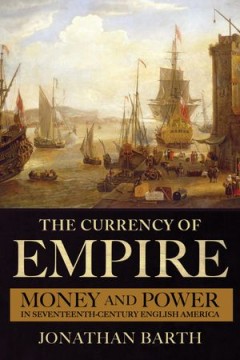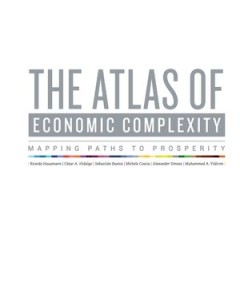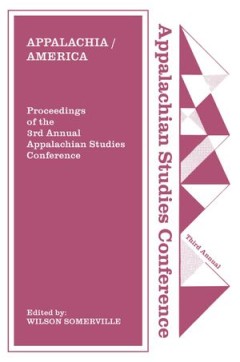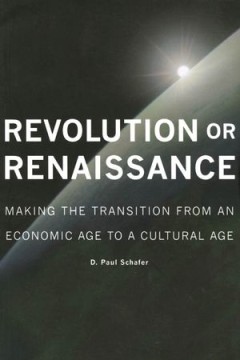Filter by

Appalachia and the Politics of Culture: Volume Seven
This volume of the Journal of the Appalachian Studies Association includes fifteen essays that represent the interdisciplinary nature of Appalachian Studies and the broad range of interests within the Appalachian Studies Association. They also represent a maturing of the field that is engaging itself in a critique not only of the political forces affecting the region, but of its own role as pol…
- Edition
- -
- ISBN/ISSN
- 9781469636955
- Collation
- -
- Series Title
- -
- Call Number
- 808.84 FIN a

Pro-ecological Restructuring of Companies : Case Studies
This book presents a practical approach to pro-environmental challenges faced by companies in the process of restructuring. It contains a broad variety of case studies from different economic sectors, and small and large businesses, in four European countries: Ukraine, Romania, Germany and Poland. The studies are the results of surveys of companies that had either already restructured or were p…
- Edition
- -
- ISBN/ISSN
- 9781911529484
- Collation
- -
- Series Title
- -
- Call Number
- 650

Money Matters : Addressing the Financial Sustainability of Security Sector Re…
Although the financial sustainability of United Nations (UN) support to institutional capacity building in post-conflict contexts may be the least analysed topic on the peacebuilding agenda, understanding the costs of rebuilding and maintaining the security sector should be one of the most important priorities for security sector reform (SSR) practitioners today. Through innovative partnerships…
- Edition
- -
- ISBN/ISSN
- 9781911529385
- Collation
- -
- Series Title
- -
- Call Number
- 650

Borders Across Healthcare: Moral Economies of Healthcare and Migration in Europe
Examining which actors determine undocumented migrants’ access to healthcare on the ground, this volume looks at what happens in the daily interactions between administrative personnel, healthcare professionals and migrant patients in healthcare institutions across Europe. Borders across Healthcare explores contemporary moral economies of the healthcare-migration nexus. The volume documents t…
- Edition
- -
- ISBN/ISSN
- 9781789207439
- Collation
- -
- Series Title
- -
- Call Number
- 301 BOR b

Doing the Right Thing : A Value Based Economy
This book is for all those who are seeking a human perspective on economic and organizational processes. It lays the foundations for a value based approach to the economy. The key questions are: “What is important to you or your organization?” “What is this action or that organization good for?” The book is directed at the prevalence of instrumentalist thinking in the current economy an…
- Edition
- -
- ISBN/ISSN
- 9781909188938
- Collation
- -
- Series Title
- -
- Call Number
- 650

The Currency of Empire : Money and Power in Seventeenth-Century English America
The export-oriented mercantile economy promoted by the English Crown, Barth argues, directed the plan for colonization, the regulation of colonial commerce, and the politics of empire. The imperial project required an orderly flow of gold and silver, and thus England's colonial regime required stringent monetary regulation. As Barth shows, money was also a flash point for resistance; many colon…
- Edition
- -
- ISBN/ISSN
- 9781501755781
- Collation
- -
- Series Title
- -
- Call Number
- 650

The Atlas of Economic Complexity
Maps capture data expressing the economic complexity of countries from Albania to Zimbabwe, offering current economic measures and as well as a guide to achieving prosperity Why do some countries grow and others do not? The authors of The Atlas of Economic Complexity offer readers an explanation based on "Economic Complexity," a measure of a society's productive knowledge. Prosperous societies …
- Edition
- -
- ISBN/ISSN
- 9780262525428
- Collation
- -
- Series Title
- -
- Call Number
- 650

Appalachia / Americ
This volume of the Proceedings of the 3rd Annual Appalachian Studies Conference, held in 1981, offers a collection of some of the more important papers presented at the conference. Paper topics include labor and the economy; land in Appalachia; urban Appalachia; education; and values and culture.
- Edition
- -
- ISBN/ISSN
- 9781469636924
- Collation
- -
- Series Title
- -
- Call Number
- 301 SOM a

Revolution or Renaissance
In Revolution or Renaissance, D. Paul Schafer subjects two of the most powerful forces in the world – economics and culture – to a detailed and historically sensitive analysis. He argues that the economic age has produced a great deal of wealth and unleashed tremendous productive power; however, it is not capable of coming to grips with the problems threatening human and non-human life on t…
- Edition
- -
- ISBN/ISSN
- 9780776606729
- Collation
- -
- Series Title
- -
- Call Number
- 650

Amériques transculturelles - Transcultural Americas
Transculturality is a new way of viewing culture that sees cultures not as separate islands that are easily differentiated from one another, but as connected and interacting webs of meaning and practice. The Americas in particular offer many examples of transcultural identities that do not fit easily into one national or ethnic mold: Chicanos, Franco-Ontarians, Creoles, and second and third gen…
- Edition
- -
- ISBN/ISSN
- 9782760307216
- Collation
- -
- Series Title
- -
- Call Number
- 650
 Computer Science, Information & General Works
Computer Science, Information & General Works  Philosophy & Psychology
Philosophy & Psychology  Religion
Religion  Social Sciences
Social Sciences  Language
Language  Pure Science
Pure Science  Applied Sciences
Applied Sciences  Art & Recreation
Art & Recreation  Literature
Literature  History & Geography
History & Geography